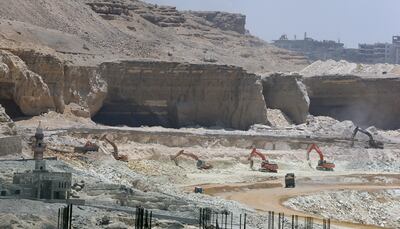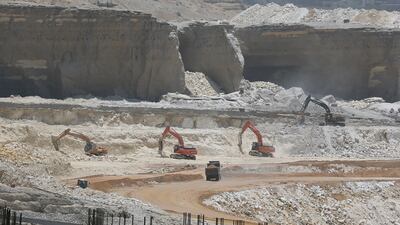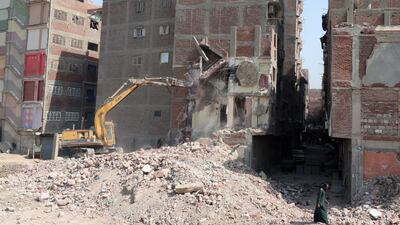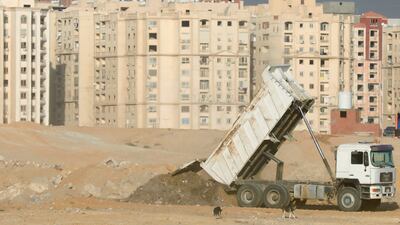A number of heritage sites in Egypt have been left damaged because of negligence by the authorities, legislator Doha Assy has told The National.
Ms Assy called for more oversight of construction and industrial activity around such sites, and submitted a formal complaint to the Egyptian parliament's antiquities committee.
“Essentially, what I am trying to do is just alert authorities that these sites are at a risk of being lost because often the antiquities sector is given a lower priority when compared to other sections on the government’s agenda,” she said.
A number of buildings in Egypt’s agricultural Daqahliyah province have sustained significant damage over the years due to large-scale unregulated construction around them.
These include Nour Mosque, which was built in 1868, Helal Bek Mosque, built in 1853, and Saint Damiana Convent, built in 1845 and renovated in 1978.
Other sites such as Ashmout fortress, the last-remaining military outpost of famous Egyptian commander Ahmed Orabi, have been damaged by years of chemical waste dumping by nearby factories. The outpost was built in the late 1800s.
Perhaps the most affected is Ahmed Nafea Mosque, which was built in 1270 and has been in a state of severe disrepair for years.
Today, the mosque, which houses three decorated marble panels from the earlier Fatimid era (909—1171), is deserted and has partially collapsed.
Ms Assy said the problem was that Egypt has an overwhelming number of archaeological sites and it was difficult for authorities to monitor each one, especially in rural areas such as Daqahliyah.
“There are rules in place that protect heritage sites in Egypt, whether they are ancient or more recent,” she said.
“They are not always implemented, however, which results in severe infractions.”
She said unregulated construction and waste at such sites had exacerbated the problem.
“It is not appropriate to surround a prominent mosque with high-rise buildings and block its panorama,” she said.
The Egyptian parliament’s media, culture and antiquities committee convened on Monday night and held a plenary session to discuss a number of bills, including Ms Assy’s request for more oversight at heritage sites.
Despite not being optimistic about the outcome as she headed in the session and expecting the committee to deny negligence on the part of authorities, Ms Assy told The National afterwards that it had been a “positive” meeting.
“The committee prepared a limited list of sites which it would endeavour to preserve during the new year. They handed over their plan to reduce negligence at various heritage sites for us to review and advise on whether we think it is appropriate,” she said.
Whether the plan is carried out or not remains to be seen, she said.
Ms Assy also submitted a bill on Monday calling for additional measures to protect workers in the antiquities field who are lowly paid and have few healthcare and social services available to them, something that has exacerbated the problem of negligence at archaeological sites.
“Last night, the committee officially appealed to the Supreme Council of Antiquities to form a healthcare fund out of its budget for its workers,” Ms Assy said.
“This was definitely one of the session's most important outcomes.”
A state-run road expansion project in a historic district of Cairo drew anger after requiring the removal of more than 2,000 graves from the City of the Dead, a necropolis that has been a Unesco heritage site since 1979.
Plan to boost public schools
A major shake-up of government-run schools was rolled out across the country in 2017. Known as the Emirati School Model, it placed more emphasis on maths and science while also adding practical skills to the curriculum.
It was accompanied by the promise of a Dh5 billion investment, over six years, to pay for state-of-the-art infrastructure improvements.
Aspects of the school model will be extended to international private schools, the education minister has previously suggested.
Recent developments have also included the introduction of moral education - which public and private schools both must teach - along with reform of the exams system and tougher teacher licensing requirements.
White hydrogen: Naturally occurring hydrogen
Chromite: Hard, metallic mineral containing iron oxide and chromium oxide
Ultramafic rocks: Dark-coloured rocks rich in magnesium or iron with very low silica content
Ophiolite: A section of the earth’s crust, which is oceanic in nature that has since been uplifted and exposed on land
Olivine: A commonly occurring magnesium iron silicate mineral that derives its name for its olive-green yellow-green colour
French business
France has organised a delegation of leading businesses to travel to Syria. The group was led by French shipping giant CMA CGM, which struck a 30-year contract in May with the Syrian government to develop and run Latakia port. Also present were water and waste management company Suez, defence multinational Thales, and Ellipse Group, which is currently looking into rehabilitating Syrian hospitals.
Killing of Qassem Suleimani
Mohammed bin Zayed Majlis
Mohammed bin Zayed Majlis
The%20specs
%3Cp%3E%0D%3Cstrong%3EEngine%3A%20%3C%2Fstrong%3E4.0-litre%20twin-turbo%20V8%0D%3Cbr%3E%3Cstrong%3EPower%3A%20%3C%2Fstrong%3E666hp%20at%206%2C000rpm%0D%3Cbr%3E%3Cstrong%3ETorque%3A%20%3C%2Fstrong%3E850Nm%20at%202%2C300-4%2C500rpm%0D%3Cbr%3E%3Cstrong%3ETransmission%3A%20%3C%2Fstrong%3E8-speed%20auto%0D%3Cbr%3E%3Cstrong%3EOn%20sale%3A%20%3C%2Fstrong%3EQ1%202023%0D%3Cbr%3E%3Cstrong%3EPrice%3A%20%3C%2Fstrong%3Efrom%20Dh1.15%20million%20(estimate)%3C%2Fp%3E%0A
PROFILE OF INVYGO
Started: 2018
Founders: Eslam Hussein and Pulkit Ganjoo
Based: Dubai
Sector: Transport
Size: 9 employees
Investment: $1,275,000
Investors: Class 5 Global, Equitrust, Gulf Islamic Investments, Kairos K50 and William Zeqiri
more from Janine di Giovanni
COMPANY%20PROFILE
%3Cp%3ECompany%20name%3A%20Znap%3C%2Fp%3E%0A%3Cp%3EStarted%3A%202017%3C%2Fp%3E%0A%3Cp%3EFounder%3A%20Uday%20Rathod%3C%2Fp%3E%0A%3Cp%3EBased%3A%20Dubai%2C%20UAE%3C%2Fp%3E%0A%3Cp%3EIndustry%3A%20FinTech%3C%2Fp%3E%0A%3Cp%3EFunding%20size%3A%20%241m%2B%3C%2Fp%3E%0A%3Cp%3EInvestors%3A%20Family%2C%20friends%3C%2Fp%3E%0A
Company%20profile
%3Cp%3E%3Cstrong%3EName%3A%20%3C%2Fstrong%3EEmonovo%20(previously%20Marj3)%0D%3Cbr%3E%3Cstrong%3EBased%3A%20%3C%2Fstrong%3ECairo%0D%3Cbr%3E%3Cstrong%3ELaunch%20year%3A%20%3C%2Fstrong%3E2016%0D%3Cbr%3E%3Cstrong%3ENumber%20of%20employees%3A%20%3C%2Fstrong%3E12%0D%3Cbr%3E%3Cstrong%3ESector%3A%20%3C%2Fstrong%3Eeducation%20technology%0D%3Cbr%3E%3Cstrong%3EFunding%3A%20%3C%2Fstrong%3Ethree%20rounds%2C%20undisclosed%20amount%3C%2Fp%3E%0A
MATCH INFO
Barcelona 5 (Lenglet 2', Vidal 29', Messi 34', 75', Suarez 77')
Valladolid 1 (Kiko 15')
Labour dispute
The insured employee may still file an ILOE claim even if a labour dispute is ongoing post termination, but the insurer may suspend or reject payment, until the courts resolve the dispute, especially if the reason for termination is contested. The outcome of the labour court proceedings can directly affect eligibility.
- Abdullah Ishnaneh, Partner, BSA Law
Mercer, the investment consulting arm of US services company Marsh & McLennan, expects its wealth division to at least double its assets under management (AUM) in the Middle East as wealth in the region continues to grow despite economic headwinds, a company official said.
Mercer Wealth, which globally has $160 billion in AUM, plans to boost its AUM in the region to $2-$3bn in the next 2-3 years from the present $1bn, said Yasir AbuShaban, a Dubai-based principal with Mercer Wealth.
“Within the next two to three years, we are looking at reaching $2 to $3 billion as a conservative estimate and we do see an opportunity to do so,” said Mr AbuShaban.
Mercer does not directly make investments, but allocates clients’ money they have discretion to, to professional asset managers. They also provide advice to clients.
“We have buying power. We can negotiate on their (client’s) behalf with asset managers to provide them lower fees than they otherwise would have to get on their own,” he added.
Mercer Wealth’s clients include sovereign wealth funds, family offices, and insurance companies among others.
From its office in Dubai, Mercer also looks after Africa, India and Turkey, where they also see opportunity for growth.
Wealth creation in Middle East and Africa (MEA) grew 8.5 per cent to $8.1 trillion last year from $7.5tn in 2015, higher than last year’s global average of 6 per cent and the second-highest growth in a region after Asia-Pacific which grew 9.9 per cent, according to consultancy Boston Consulting Group (BCG). In the region, where wealth grew just 1.9 per cent in 2015 compared with 2014, a pickup in oil prices has helped in wealth generation.
BCG is forecasting MEA wealth will rise to $12tn by 2021, growing at an annual average of 8 per cent.
Drivers of wealth generation in the region will be split evenly between new wealth creation and growth of performance of existing assets, according to BCG.
Another general trend in the region is clients’ looking for a comprehensive approach to investing, according to Mr AbuShaban.
“Institutional investors or some of the families are seeing a slowdown in the available capital they have to invest and in that sense they are looking at optimizing the way they manage their portfolios and making sure they are not investing haphazardly and different parts of their investment are working together,” said Mr AbuShaban.
Some clients also have a higher appetite for risk, given the low interest-rate environment that does not provide enough yield for some institutional investors. These clients are keen to invest in illiquid assets, such as private equity and infrastructure.
“What we have seen is a desire for higher returns in what has been a low-return environment specifically in various fixed income or bonds,” he said.
“In this environment, we have seen a de facto increase in the risk that clients are taking in things like illiquid investments, private equity investments, infrastructure and private debt, those kind of investments were higher illiquidity results in incrementally higher returns.”
The Abu Dhabi Investment Authority, one of the largest sovereign wealth funds, said in its 2016 report that has gradually increased its exposure in direct private equity and private credit transactions, mainly in Asian markets and especially in China and India. The authority’s private equity department focused on structured equities owing to “their defensive characteristics.”
UAE currency: the story behind the money in your pockets
SPEC%20SHEET%3A%20SAMSUNG%20GALAXY%20Z%20FOLD%204
%3Cp%3E%3Cstrong%3EMain%20display%3A%3C%2Fstrong%3E%207.6%22%20QXGA%2B%20Dynamic%20Amoled%202X%2C%202176%20x%201812%2C%2021.6%3A18%2C%20374ppi%2C%20HDR10%2B%2C%20up%20to%20120Hz%3C%2Fp%3E%0A%3Cp%3E%3Cstrong%3ECover%20display%3A%3C%2Fstrong%3E%206.2%22%20HD%2B%20Dynamic%20Amoled%202X%2C%202316%20x%20904%2C%2023.1%3A9%2C%20402ppi%2C%20up%20to%20120Hz%3C%2Fp%3E%0A%3Cp%3E%3Cstrong%3EProcessor%3A%3C%2Fstrong%3E%20Qualcomm%20Snapdragon%208%2B%20Gen%201%2C%204nm%2C%20octa-core%3B%20Adreno%20730%20GPU%3C%2Fp%3E%0A%3Cp%3E%3Cstrong%3EMemory%3A%3C%2Fstrong%3E%2012GB%3C%2Fp%3E%0A%3Cp%3E%3Cstrong%3ECapacity%3A%3C%2Fstrong%3E%C2%A0256%2F512GB%20%2F%201TB%3C%2Fp%3E%0A%3Cp%3E%3Cstrong%3EPlatform%3A%3C%2Fstrong%3E%20Android%2012%2C%20One%20UI%204.1.1%3C%2Fp%3E%0A%3Cp%3E%3Cstrong%3EMain%20camera%3A%3C%2Fstrong%3E%20Triple%2012MP%20ultra-wide%20(f%2F2.2)%20%2B%2050MP%20wide%20(f%2F1.8)%20%2B%2010MP%20telephoto%20(f%2F2.4)%2C%20dual%20OIS%2C%203x%20optical%20zoom%2C%2030x%20Space%20Zoom%2C%20portrait%2C%20super%20slo-mo%3C%2Fp%3E%0A%3Cp%3E%3Cstrong%3EVideo%3A%3C%2Fstrong%3E%208K%4024fps%2C%204K%4030%2F60fps%2C%20full-HD%4030%2F60fps%2C%20HD%4030fps%3B%20slo-mo%4060%2F240%2F960fps%3B%20HDR10%2B%3C%2Fp%3E%0A%3Cp%3E%3Cstrong%3ECover%20camera%3A%3C%2Fstrong%3E%2010MP%20(f%2F2.2)%3C%2Fp%3E%0A%3Cp%3E%3Cstrong%3EInner%20front%20camera%3A%3C%2Fstrong%3E%20Under-display%204MP%20(f%2F1.8)%3C%2Fp%3E%0A%3Cp%3E%3Cstrong%3EBattery%3A%3C%2Fstrong%3E%204400mAh%2C%2025W%20fast%20charging%2C%2015W%20wireless%20charging%2C%20reverse%20wireless%20charging%2C%20'all-day'%20life%3C%2Fp%3E%0A%3Cp%3E%3Cstrong%3EConnectivity%3A%3C%2Fstrong%3E%205G%3B%20Wi-Fi%2C%20Bluetooth%205.2%2C%20NFC%20(Samsung%20Pay)%3C%2Fp%3E%0A%3Cp%3E%3Cstrong%3EI%2FO%3A%3C%2Fstrong%3E%20USB-C%3C%2Fp%3E%0A%3Cp%3E%3Cstrong%3ECards%3A%3C%2Fstrong%3E%20Nano-SIM%20%2B%20eSIM%3B%202%20nano-SIMs%20%2B%20eSIM%3B%202%20nano-SIMs%3C%2Fp%3E%0A%3Cp%3E%3Cstrong%3EColours%3A%3C%2Fstrong%3E%20Graygreen%2C%20phantom%20black%2C%20beige%2C%20burgundy%20(online%20exclusive)%3C%2Fp%3E%0A%3Cp%3E%3Cstrong%3EIn%20the%20box%3A%3C%2Fstrong%3E%20Fold%204%2C%20USB-C-to-USB-C%20cable%3C%2Fp%3E%0A%3Cp%3E%3Cstrong%3EPrice%3A%3C%2Fstrong%3E%20Dh6%2C799%20%2F%20Dh7%2C249%20%2F%20Dh8%2C149%3C%2Fp%3E%0A
The specs
Engine: 5.0-litre supercharged V8
Transmission: Eight-speed auto
Power: 575bhp
Torque: 700Nm
Price: Dh554,000
On sale: now
The%20team
%3Cp%3E%0DFashion%20director%3A%20Sarah%20Maisey%0D%3Cbr%3EPhotographer%3A%20Greg%20Adamski%0D%3Cbr%3EHair%20and%20make-up%3A%20Ania%20Poniatowska%0D%3Cbr%3EModels%3A%20Nyajouk%20and%20Kristine%20at%20MMG%2C%20and%20Mitchell%0D%3Cbr%3EStylist%E2%80%99s%20assistants%3A%20Nihala%20Naval%20and%20Sneha%20Maria%20Siby%0D%3Cbr%3EVideographer%3A%20Nilanjana%20Gupta%3C%2Fp%3E%0A
The%20specs
%3Cp%3E%3Cstrong%3EEngine%3A%20%3C%2Fstrong%3ETwin-turbo%2C%20V8%3Cbr%3E%3Cstrong%3ETransmission%3A%20%3C%2Fstrong%3E8-speed%20automatic%20and%20manual%3Cbr%3E%3Cstrong%3EPower%3A%20%3C%2Fstrong%3E503%20bhp%3Cbr%3E%3Cstrong%3ETorque%3A%20%3C%2Fstrong%3E513Nm%3Cbr%3E%3Cstrong%3EPrice%3A%20%3C%2Fstrong%3Efrom%20Dh646%2C800%20(%24176%2C095)%3Cbr%3E%3Cstrong%3EOn%20sale%3A%20%3C%2Fstrong%3Enow%3C%2Fp%3E%0A
Cinco in numbers
Dh3.7 million
The estimated cost of Victoria Swarovski’s gem-encrusted Michael Cinco wedding gown
46
The number, in kilograms, that Swarovski’s wedding gown weighed.
1,000
The hours it took to create Cinco’s vermillion petal gown, as seen in his atelier [note, is the one he’s playing with in the corner of a room]
50
How many looks Cinco has created in a new collection to celebrate Ballet Philippines’ 50th birthday
3,000
The hours needed to create the butterfly gown worn by Aishwarya Rai to the 2018 Cannes Film Festival.
1.1 million
The number of followers that Michael Cinco’s Instagram account has garnered.
UAE currency: the story behind the money in your pockets
UAE%20SQUAD
%3Cp%3E%0DJemma%20Eley%2C%20Maria%20Michailidou%2C%20Molly%20Fuller%2C%20Chloe%20Andrews%20(of%20Dubai%20College)%2C%20Eliza%20Petricola%2C%20Holly%20Guerin%2C%20Yasmin%20Craig%2C%20Caitlin%20Gowdy%20(Dubai%20English%20Speaking%20College)%2C%20Claire%20Janssen%2C%20Cristiana%20Morall%20(Jumeirah%20English%20Speaking%20School)%2C%20Tessa%20Mies%20(Jebel%20Ali%20School)%2C%20Mila%20Morgan%20(Cranleigh%20Abu%20Dhabi).%3C%2Fp%3E%0A
Aayan%E2%80%99s%20records
%3Cp%3E%3Cstrong%3EYoungest%20UAE%20men%E2%80%99s%20cricketer%3C%2Fstrong%3E%3Cbr%3EWhen%20he%20debuted%20against%20Bangladesh%20aged%2016%20years%20and%20314%20days%2C%20he%20became%20the%20youngest%20ever%20to%20play%20for%20the%20men%E2%80%99s%20senior%20team.%20He%20broke%20the%20record%20set%20by%20his%20World%20Cup%20squad-mate%2C%20Alishan%20Sharafu%2C%20of%2017%20years%20and%2044%20days.%3Cbr%3E%20%3Cbr%3E%3Cstrong%3EYoungest%20wicket-taker%3C%2Fstrong%3E%3Cbr%3EAfter%20taking%20the%20wicket%20of%20Bangladesh%E2%80%99s%20Litton%20Das%20on%20debut%20in%20Dubai%2C%20Aayan%20became%20the%20youngest%20male%20cricketer%20to%20take%20a%20wicket%20against%20a%20Full%20Member%20nation%20in%20a%20T20%20international.%3Cbr%3E%20%3Cbr%3E%3Cstrong%3EYoungest%20in%20T20%20World%20Cup%20history%3F%3C%2Fstrong%3E%3Cbr%3EAayan%20does%20not%20turn%2017%20until%20November%2015%20%E2%80%93%20which%20is%20two%20days%20after%20the%20T20%20World%20Cup%20final%20at%20the%20MCG.%20If%20he%20does%20play%20in%20the%20competition%2C%20he%20will%20be%20its%20youngest%20ever%20player.%20Pakistan%E2%80%99s%20Mohammed%20Amir%2C%20who%20was%2017%20years%20and%2055%20days%20when%20he%20played%20in%202009%2C%20currently%20holds%20the%20record.%3C%2Fp%3E%0A
Muslim Council of Elders condemns terrorism on religious sites
The Muslim Council of Elders has strongly condemned the criminal attacks on religious sites in Britain.
It firmly rejected “acts of terrorism, which constitute a flagrant violation of the sanctity of houses of worship”.
“Attacking places of worship is a form of terrorism and extremism that threatens peace and stability within societies,” it said.
The council also warned against the rise of hate speech, racism, extremism and Islamophobia. It urged the international community to join efforts to promote tolerance and peaceful coexistence.
Tips%20for%20holiday%20homeowners
%3Cp%3EThere%20are%20several%20factors%20for%20landlords%20to%20consider%20when%20preparing%20to%20establish%20a%20holiday%20home%3A%3C%2Fp%3E%0A%3Cul%3E%0A%3Cli%3E%3Cstrong%3ERevenue%20potential%20of%20the%20unit%3A%3C%2Fstrong%3E%20location%2C%20view%20and%20size%3C%2Fli%3E%0A%3Cli%3E%3Cstrong%3EDesign%3A%20furnished%20or%20unfurnished.%3C%2Fstrong%3E%20Is%20the%20design%20up%20to%20standard%2C%20while%20being%20catchy%20at%20the%20same%20time%3F%3C%2Fli%3E%0A%3Cli%3E%3Cstrong%3EBusiness%20model%3A%3C%2Fstrong%3E%20will%20it%20be%20managed%20by%20a%20professional%20operator%20or%20directly%20by%20the%20owner%2C%20how%20often%20does%20the%20owner%20wants%20to%20use%20it%20for%20personal%20reasons%3F%3C%2Fli%3E%0A%3Cli%3E%3Cstrong%3EQuality%20of%20the%20operator%3A%3C%2Fstrong%3E%20guest%20reviews%2C%20customer%20experience%20management%2C%20application%20of%20technology%2C%20average%20utilisation%2C%20scope%20of%20services%20rendered%3C%2Fli%3E%0A%3C%2Ful%3E%0A%3Cp%3E%3Cem%3ESource%3A%20Adam%20Nowak%2C%20managing%20director%20of%20Ultimate%20Stay%20Vacation%20Homes%20Rental%3C%2Fem%3E%3C%2Fp%3E%0A
A Long Way Home by Peter Carey
Faber & Faber
Command%20Z
%3Cp%3E%3Cstrong%3EDirector%3A%C2%A0%3C%2Fstrong%3ESteven%20Soderbergh%3C%2Fp%3E%0A%3Cp%3E%3Cstrong%3EStars%3A%C2%A0%3C%2Fstrong%3EMichael%20Cera%2C%20Liev%20Schreiber%2C%20Chloe%20Radcliffe%3C%2Fp%3E%0A%3Cp%3E%3Cstrong%3ERating%3A%3C%2Fstrong%3E%C2%A03%2F5%3C%2Fp%3E%0A
More from Rashmee Roshan Lall
Super Saturday race card
4pm: Mahab Al Shimaal Group 3 | US$350,000 | (Dirt) | 1,200m
4.35pm: Al Bastakiya Listed | $300,000 | (D) | 1,900m
5.10pm: Nad Al Sheba Turf Group 3 | $350,000 | (Turf) | 1,200m
5.45pm: Burj Nahaar Group 3 | $350,000 | (D) | 1,600m
6.20pm: Dubai City of Gold Group 2 | $300,000 | (T) | 2,410m
6.55pm: Al Maktoum Challenge Round 3 Group 1 | $600,000 | (D) | 2,000m
7.30pm: Jebel Hatta Group 1 | $400,000 | (T) | 1,800m
The specs
Engine: 2.0-litre 4cyl turbo
Power: 261hp at 5,500rpm
Torque: 405Nm at 1,750-3,500rpm
Transmission: 9-speed auto
Fuel consumption: 6.9L/100km
On sale: Now
Price: From Dh117,059








